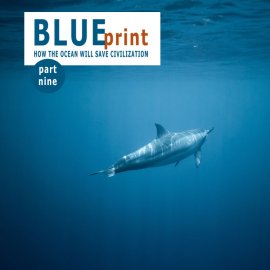Who is Listening?
-
English
-
ListenPause
[intro music]
Welcome to World Ocean Radio…
I’m Peter Neill, Director of the World Ocean Observatory.
Who is listening? Organizations, publications, environmental groups, and fervent individuals constitute a chorus of voices advocating for the ocean, promoting the science and implication of climate change, launching initiatives, recommending policies, introducing legislation and regulatory modifications, lobbying officials, advancing research and prediction based on the best science, reaching out via podcast, blog, and social media platforms – in effect, amplifying a message and agenda for reaction and change worldwide. The United Nations has offered a catalogue of Sustainable Development Goals; the international policy apparat and World Bank have joined in with substantive suggestion and targeted finance; a growing coalition of organizations and determined individuals are performing a cacophony of communication and exhortation for specific agendas, certain actions, and transformational change. Millions of dollars have been raised and spent. To what avail, amidst all the noise?
What is the purpose of all this investment of energy and funds and manic attention other than to move the public from one understanding and mode of behavior to another, aggravated by urgency and the rapidly revealed evidence of climate impacts in the form of drought, fire, extreme weather, sea level rise, community disruption, refugee re-location, and the evident undermining of conventional economic exchange, labor patterns, and international finance? What more will it take to move the needle, to shift the balance, to convince the politicians, to make sense out of the aural, textual, experiential, and socio-political non-sense?
What has become so tragically apparent is that the unexpected Covid-19 pandemic has surprised, tested, and sustained a global perception of uncertainty and stasis revealed by failed governmental preparation and procedure and the inability of an integrated world economy to adapt and respond. Markets soldier on, in my view mostly as a self-assuring performance of unsubstantiated hope and fear. Stocks dance to a St. Vitas rhythm. Bankruptcies proliferate. Bail-outs and accelerating debt prove to be only half-measures. The real estate market goes cold, and hot, depending, ironically, on climate change predictions as signals for safe havens in the future. What to do? Denial helps some who simply cannot understand the scope and magnitude of the problem. Bureaucrats look to old models, re-direct funds to old solutions that no longer fease. Politicians point fingers and look for blame and places to hide. The public is baffled, as credibility and trust decline and no leadership or plan emerges to prevent in time the death of institutions and literally millions of people worldwide. There is a pervasive global malaise that is undermining our optimism, our energy, our imagination, and our sense of personal and community well-being. All talk of equity and justice fades as an insinuating survival mind-set corrodes our values, our inter-personal relations, our community spirit, and our hope for the future.
The United Nations responds from within the context of relief, an urgent call for funds beyond those generated by the richest, most developed nations to aid those peoples and places without the resources to respond: humanitarian reaction to relieve and redress the physical and psychological destruction of an anti-historical force of disease.
This is a dark description for a dark time.
When looking forward to mandatory change, there seem to be only two paths: first, an evolutionary way based on incremental change, consensus agreement, and inadequate financial resources typically implemented top-down by government and committed leaders; or, second, a revolutionary way based on rejection of conventional, radical change, assertion of a new strategy without compromise, and necessary human resources typically implemented bottom-up by a public committed, aggressively, even violently, to necessary survival.
Who is listening? Who is hearing and acting? What gives me strength to answer these questions is the evidence of gathering and acting by individuals in groups around me, standing up first against an evident failure, and then for a prospective success that rights wrongs and invents alternatives that are essential for change. I see it in protests in the streets, inside corporations and political organizations, and calls for new ideas, processes, and behaviors. This is not a disconnected, anarchic, chaotic shout, but rather a connected, synergized, harmonious anthem for a new course, an itinerary for change.
Compare this anthem to oceanic sound. Sitting by the sea you hear an aggregated chorus of wave sounds and wind, calls of birds, even the imperceptible soundings of whales, that when taken apart into their component pieces present an exhilarating score, a chorus of actions in a challenging place and time. In our stasis, we can hear it; in our disillusion, we can compose such a song; in our disconnection, we can unite as an orchestra playing a symphony of the sea. Are you listening?
We will discuss these issues, and more, in future editions of World Ocean Radio.
[outro music]
This week on World Ocean Radio: part nine of the multi-part BLUEprint series. Myriad organizations, environmental groups and fervent individuals are advocating for the ocean by promoting the science and implications of climate change, launching initiatives, recommending policies, lobbying, advancing research based on the best science, and reaching out via podcast, blog, and social media platforms to amplify a message and agenda for reaction and change worldwide. Is anyone listening amidst all the noise?

The "BLUEprint Series: How the Ocean Will Save Civilization" outlines a new and sustainable path forward, with the ocean leading the way.
About World Ocean Radio
Since 2009, a weekly 5-minute podcast covering a broad spectrum of ocean issues from science and education to advocacy and exemplary projects. World Ocean Radio, a project of the World Ocean Observatory is available for syndicated use at no cost by college and community radio stations worldwide. Contact director@thew2o.net if you are interested in becoming an affiliate or know of a radio station that should be broadcasting these episodes each week.
Image
Jeremy Bishop on Unsplash
- Login to post comments



